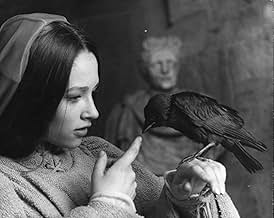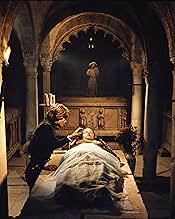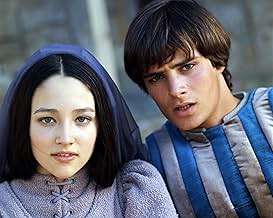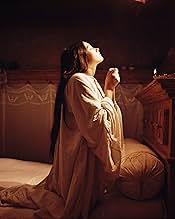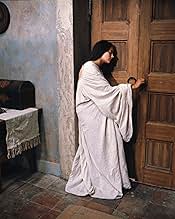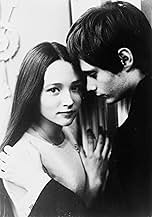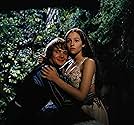AVALIAÇÃO DA IMDb
7,6/10
37 mil
SUA AVALIAÇÃO
Quando dois jovens membros de famílias rivais se encontram, o amor proibido inicia.Quando dois jovens membros de famílias rivais se encontram, o amor proibido inicia.Quando dois jovens membros de famílias rivais se encontram, o amor proibido inicia.
- Direção
- Roteiristas
- Artistas
- Ganhou 2 Oscars
- 16 vitórias e 16 indicações no total
Avaliações em destaque
Zefferelli is a sporadic master. Here he is in his prime. See how he understands how to direct groups, how to continue a motion from one frame to the next, how to use color to punctuate.
What has happened here is that he has hit on a formula that works toward the problem of moving Shakespeare (a verbal, intellectual event) into film (a matter of motion and image).
It works because the play can be cast largely in terms of crowds, sometimes mobs. Never have I seen this done so well.
Much of the verbal poetry is cut, and image poetry replaced in sufficient measure to satisfy. Mercutio is rightly seen as the heart of the play, balanced by the Nurse. Both are terrific.
Oh how I wish we could combine the cinematic skills of young Zefferelli with the Shakespearian insights of Branagh and the imagination of Greenaway to do, say a Lear. Bliss in the imagining.
What has happened here is that he has hit on a formula that works toward the problem of moving Shakespeare (a verbal, intellectual event) into film (a matter of motion and image).
It works because the play can be cast largely in terms of crowds, sometimes mobs. Never have I seen this done so well.
Much of the verbal poetry is cut, and image poetry replaced in sufficient measure to satisfy. Mercutio is rightly seen as the heart of the play, balanced by the Nurse. Both are terrific.
Oh how I wish we could combine the cinematic skills of young Zefferelli with the Shakespearian insights of Branagh and the imagination of Greenaway to do, say a Lear. Bliss in the imagining.
There were not many directors like Zeffirelli around during those golden years -sixties and seventies -of the Italian cinema.Because he was not part of the champagne socialists,because he made movies completely devoid of social concerns,he was generally dismissed by the European critics (and his fellow colleagues) as non-hip and reactionary. When you see these movies today,you realize how much they have worn well,and how much his detractors were wrong:Zeffirelli has never tried to change the world,but he has given beautiful movies which have stood the test of time quite well,perhaps because they are timeless.Even an epic and absorbing -and diametrically opposite to Zeffirelli's cinema - political work like Bertolucci's "Novecento" (1976) displays cheesy gauchism so trendy before the eighties in Europa .
This is the second of the three Zeffirelli screen adaptations of Shakespeare -as a matter of interest,the others are "taming of the shrew"(1967 with E Taylor and R Burton) and "Hamlet" (1990 with M.Gibson and G.Close)-and it 's probably the best:Zeffirelli's genius was to cast actors (about) the age of the heroes as the leads.And Leonard Whiting and Olivia Hussey,both very beautiful,make up for their lack of experience with their youth,their innocence and the intensity of their looks.They are far better than Leonardo Di Caprio and Claire Danes in the drag queens cum west side story Luhrmann's 1996 version.Besides they get strong support from dark-haired Mickael York as Tybalt and John MCEnnery as Mercutio.The colors are,as always in a Zephirelli movie (see taming,and his made-for-TV Jesus)dazzling.Two scenes stand out:the ball and the lovers death in the Capulet tomb.
Filmed on location in Verona,we never have the feeling that we are watching filmed stage production,not a small feat.This is the definitive screen version of the Elizabethan classic.Sir Laurence Olivier is the narrator.
This is the second of the three Zeffirelli screen adaptations of Shakespeare -as a matter of interest,the others are "taming of the shrew"(1967 with E Taylor and R Burton) and "Hamlet" (1990 with M.Gibson and G.Close)-and it 's probably the best:Zeffirelli's genius was to cast actors (about) the age of the heroes as the leads.And Leonard Whiting and Olivia Hussey,both very beautiful,make up for their lack of experience with their youth,their innocence and the intensity of their looks.They are far better than Leonardo Di Caprio and Claire Danes in the drag queens cum west side story Luhrmann's 1996 version.Besides they get strong support from dark-haired Mickael York as Tybalt and John MCEnnery as Mercutio.The colors are,as always in a Zephirelli movie (see taming,and his made-for-TV Jesus)dazzling.Two scenes stand out:the ball and the lovers death in the Capulet tomb.
Filmed on location in Verona,we never have the feeling that we are watching filmed stage production,not a small feat.This is the definitive screen version of the Elizabethan classic.Sir Laurence Olivier is the narrator.
10JFClift
I have seen multiple versions of R&J, from the 30's version, with Leslie Howard (in his 40's I think) & Norma Shearer, to the most recent thing with DeCaprio & Danes. None of them touched me in the way that Zefferelli's did, & continues to do. It was one of the first DVD's I bought, because I can watch it again & again, & still be heartbroken by the ending.
The thing that shook me most the first time I saw it was that, in spite of the Shakespearian language, I got the meaning of the characters' statements immediately. The Shakespearian language was not a barrier at all. I had previously had to spend anywhere from 15 to 20 minutes before I could begin to follow the dialogue....there was no lag time with this version. To me, it will always be the definitive film version of this classic.
The thing that shook me most the first time I saw it was that, in spite of the Shakespearian language, I got the meaning of the characters' statements immediately. The Shakespearian language was not a barrier at all. I had previously had to spend anywhere from 15 to 20 minutes before I could begin to follow the dialogue....there was no lag time with this version. To me, it will always be the definitive film version of this classic.
To my way of thinking, this film should be considered when people discuss the greatest movies of all time. Every scene, practically every frame of this movie is brilliant. Director Zeffirelli went against the ancient practice of using older actors in the title roles, and the performances he elicits from teenagers Whiting and Hussey is amazing. Although he trims the dialog heavily in places (Romeo says, "But soft, what light through yonder window breaks?"- and leaves it at that) his version captures all the passion of Shakespeare's play magnificently.
The scenes at the Capulet's ball at which the two young lovers meet are about the greatest I've ever seen on screen. The famous balcony scene avoids cliches altogether and makes others pale by comparison. The Queen Mab speech, the fight, and the scene in the tomb are all exquisite highlights of this film. Even the dubbing for the Italian actor's voices and of the crowd noise is superior. It is amazing to me that an Italian could be so sensitively in tune with one of the English language's most sublime works.
Zeffirelli wanted to make a movie that spoke to youth and he succeeded, to put it very mildly. If school systems were smart, they'd pack up their freshmen and sophomores on buses every year, drive them to a local theatre and show them this movie. I can't think of a better investment in young people's education that could be made. It worked for me.
The scenes at the Capulet's ball at which the two young lovers meet are about the greatest I've ever seen on screen. The famous balcony scene avoids cliches altogether and makes others pale by comparison. The Queen Mab speech, the fight, and the scene in the tomb are all exquisite highlights of this film. Even the dubbing for the Italian actor's voices and of the crowd noise is superior. It is amazing to me that an Italian could be so sensitively in tune with one of the English language's most sublime works.
Zeffirelli wanted to make a movie that spoke to youth and he succeeded, to put it very mildly. If school systems were smart, they'd pack up their freshmen and sophomores on buses every year, drive them to a local theatre and show them this movie. I can't think of a better investment in young people's education that could be made. It worked for me.
This was the first time we actually saw the teenage love Shakespeare intended. Years and years before Leonardo Di Caprio and Clare Danes, Leonard Whiting and Olivia Houssey gave life to the tragic story told in this ancestral tale, revamping it without betraying it, making it accessible to a 60s audience without updating it. Leonard and Olivia were so beautiful that Shakespeare became trendy again and I don't mean any disrespect by it, I'm simply stating a fact. The real, stunning, dusty locations, the costumes, the faces, the music made the whole thing a totally new Shakespearen experience. Remember than the biggest screen adaptation of this play had been with the forty something Leslie Howard and Norma Shearer in those roles. Here everything reeked of youth underlining the tragedy in the most cinematic way. Another important point is to confirm that in 2007 the film still feels young and fresh. Recommended
Você sabia?
- CuriosidadesSir Laurence Olivier agreed to play the uncredited role of the narrator, because he was so impressed with Zeffirelli's work for the National Theatre of Great Britain, of which Olivier was director at the time. Not only was Olivier the narrator, but as Franco Zeffirelli has also confirmed, he dubbed Antonio Pierfederici's voice (due to the actor's heavy Italian accent) as well as lending his voice to other anonymous characters. He did it all for the love of William Shakespeare, and didn't accept any payment.
- Erros de gravaçãoWhen Romeo and Juliet's bodies are laid out in front of the ruler, Romeo takes a deep breath.
- Versões alternativasIn the film's original release, and on DVD, the "End Titles" music continues playing on a black screen after the closing credits have ended, much as "Exit Music" used to do in roadshow releases of films. As currently (2009) shown on cable TV, however, there is an edit on the soundtrack (not on the picture) during the closing credits, so that the music ends exactly at the same time that the visual portion of the film does.
- ConexõesEdited into O Show Não Pode Parar (2002)
Principais escolhas
Faça login para avaliar e ver a lista de recomendações personalizadas
- How long is Romeo and Juliet?Fornecido pela Alexa
Detalhes
- Data de lançamento
- Países de origem
- Idiomas
- Também conhecido como
- Romeu & Julieta
- Locações de filme
- Pienza, Siena, Tuscany, Itália(Piazza Pio II: some shots of the street brawl)
- Empresas de produção
- Consulte mais créditos da empresa na IMDbPro
Bilheteria
- Orçamento
- US$ 850.000 (estimativa)
- Faturamento bruto mundial
- US$ 6.292
Contribua para esta página
Sugerir uma alteração ou adicionar conteúdo ausente


